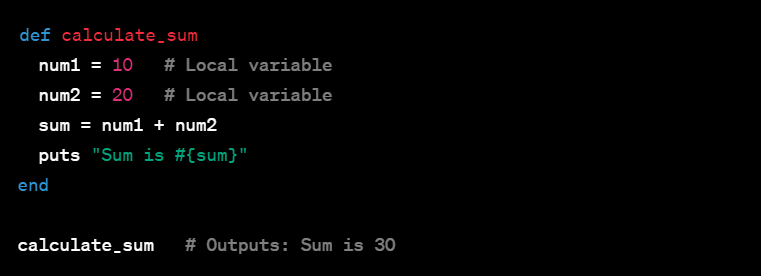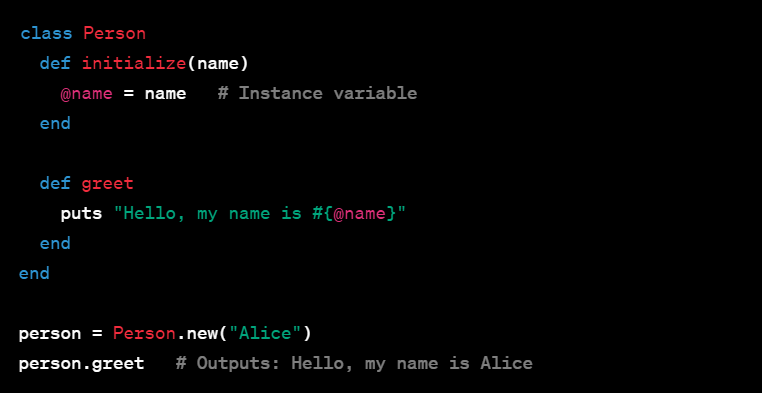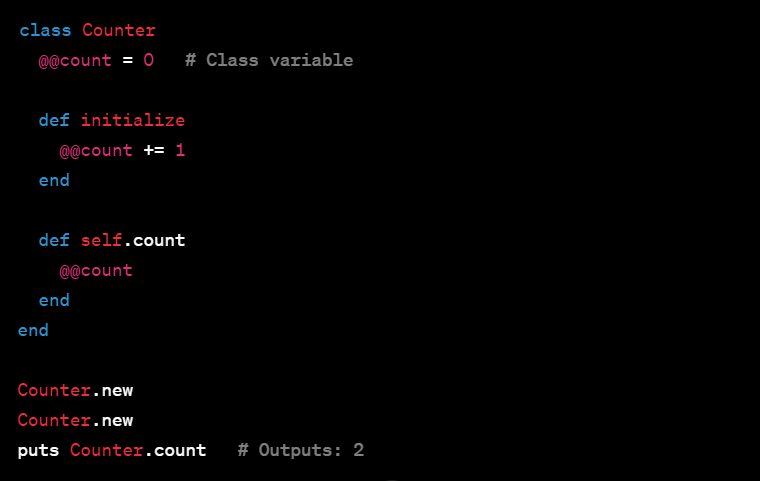We know the essentials of variables in Ruby. This article covers everything from basic declaration to advanced concepts for Ruby enthusiasts.
More...
Variables are a fundamental concept in Ruby programming. Knowing how variables work, including their scopes, types, and best practices, is strongly suggested for improving programming efficiency and clarity.
Here we go with the different types of variables in Ruby.
Key Takeaways

Variables in Ruby with Analogies
Variables can sometimes seem overwhelming, especially for beginners, but they are actually quite straightforward to understand. To demystify the concept of variables, we can draw analogies from the real world. By comparing variables to familiar concepts, we can make them more relatable and easier to comprehend.
Just like numbers, variables are used to store and manipulate data. We can think of variables as containers that hold information, much like how we use boxes to store and organize our belongings. Each variable has a unique name, allowing us to access and manipulate its contents whenever needed.
Let's take a look at some simple examples to help illustrate the concept of variables:
1. Addition
Imagine you have two numbers, 3 and 5. Instead of directly using these numbers in your code, you can store them in variables for easier reference. Let's call the first variable "num1" and the second variable "num2". Now, whenever you need to perform addition, you can simply add the variables together: sum = num1 + num2. This way, you can reuse the same variables for different calculations, making your code more flexible and efficient.
2. Comparison
Suppose you have two temperature readings, one from today and one from yesterday. To calculate the temperature difference, you can store these readings in variables, let's call them "todayTemp" and "yesterdayTemp". By subtracting the value of "yesterdayTemp" from "todayTemp", you can obtain the temperature difference. Having variables to represent the temperatures not only makes the code more readable but also allows for easy updates if new temperature readings are obtained.
Now, we can better understand how variables function in programming. They act as placeholders for data, making it simpler to manipulate and work with information. Just as we organize our belongings in boxes or perform calculations using numbers, variables help organize and process data in coding.
So Why Use Variables?
Variables are essential because they allow programmers to:
- 1Store Data: You can keep data like user input, calculation results, or system-generated values.
- 2Manipulate Data: Variables enable the modification of stored data through calculations or operations.
- 3Increase Code Readability: Using variables with descriptive names makes your code easier to understand and maintain.
- 4Reusability and Scalability: Variables make it easy to update and manage data in one place, affecting all parts of the program that use the variable.
Variable Types in Ruby
In Ruby, there are several types of variables that serve different purposes and have their own rules and scopes. Getting to know the differences between these variable types is preferred for writing clean and efficient code.
Local Variables
Local variables are declared within a specific code block and are only accessible within that block. They have a limited scope and are typically used to store temporary data or intermediate values within a method or a loop.
Code snippet example:

Instance Variables
Instance variables belong to a specific object and are accessible by all methods within that object. They have a wider scope compared to local variables and are often used to store data that needs to be shared across different methods within an object.
Code snippet example:

Class Variables
Class variables are shared among all instances of a class. They are declared at the class level and can be accessed by any method of the class or its subclasses. Class variables are often used to store data that is common to all instances of a class.
Code snippet example:

Global Variables
Global variables can be accessed from anywhere in the program. They have the widest scope among all variable types and can be used to store data that needs to be shared across different parts of a program.
However, global variables should be used sparingly as they can make code harder to maintain and debug.

Choosing the appropriate variable type based on the intended usage and ensuring proper scoping is essential for writing clean, maintainable, and efficient Ruby code.
For a broader perspective on your journey as a software developer, explore our roadmap.
Ruby Variables vs. Other Languages
This table provides a quick reference to understand how Ruby handles variables compared to Python, JavaScript, and Java. It highlights key differences and similarities, aiding programmers familiar with these high level programming languages in adapting to Ruby's style and conventions.
Feature | Ruby | Python | JavaScript | Java |
|---|---|---|---|---|
Variable Declaration | No explicit type declaration. Instance and class variables marked with @ and @@. | No explicit type declaration. Global variables defined using global keyword. | Uses var, let, or const for declaration. Block scope is significant. | Requires explicit data type declaration. |
Global Variables | Identified with $ prefix. | No special syntax; scope defined by global. | Scope global when declared outside functions without let or const. | No global variables in the traditional sense; uses static fields instead. |
Immutability | All variables are mutable. | Some data types (like strings and tuples) are immutable. | All types are mutable, but const can make variable references immutable. | Offers final variables for immutability. |
Object Properties/Instance Variables | Accessed via getter and setter methods. | Direct access or via properties. | Properties accessed directly with dot notation. | Accessed through methods; direct access controlled by access modifiers. |
Class Variables | Shared among instances with @@. | No direct equivalent. Class attributes are not shared across instances. | No direct equivalent. Prototype properties or static class properties are used. | Uses static fields, shared among instances. |
To see how libraries in other languages like Python and Java work with variables, explore our guides on Python and Java libraries.
Ruby Variable Scopes
In Ruby programming, each variable type has its own scope, which determines the accessibility of the variable. Picking up knowledge on variable scopes is best for effectively managing and organizing your code. Let's take a closer look at the different variable scopes in Ruby:
Local Variable Scope
Local variables in Ruby have a narrow scope and are only accessible within the code block they are declared in. These variables are typically used to store temporary data or values that are specific to a particular section of the code. Once the code block is exited, the local variable is no longer accessible.
Instance Variable Scope
Instance variables, denoted by the "@" symbol, are accessible across different methods within an object. These variables are used to store state or data that needs to be shared between different methods within the same object. Instance variables persist as long as the object exists.
Class Variable Scope
Class variables, denoted by the "@@" symbol, are shared among all instances of a class. They are used to store data that is shared across different objects of the same class. Class variables are accessible within the class definition and its subclasses. They retain their values throughout the lifetime of the program.
Global Variable Scope
Global variables have a global scope and can be accessed from anywhere in the program. These variables are declared outside of any code block or object and can be accessed and modified from any part of the code. However, it is generally recommended to avoid using global variables as they can lead to unexpected side effects and make the code less maintainable.
Studying variable scopes in Ruby is essential for writing clean and efficient code. By appropriately defining the scope of each variable, you can ensure that your code is organized, modular, and easy to understand.
Best Practices for Working with Variables in Ruby
When working with variables in Ruby, follow best practices to ensure clean and maintainable code. By adhering to these guidelines, you can enhance the readability of your code, mitigate naming conflicts, and safeguard your data from unintended access or modification.
Use Descriptive and Meaningful Variable Names
Choosing appropriate and descriptive variable names is essential for code comprehension. Aim for names that accurately reflect the purpose and usage of the variable. Avoid using vague or generic names that may confuse other developers or even yourself when revisiting the code in the future.
Follow Naming Conventions
Adhering to naming conventions is a common practice in the software development community. By following established conventions, such as using lowercase letters and underscores for local variables, camel case for instance variables, and uppercase letters for class variables, you ensure consistency and improve code readability. Consistency in naming also promotes collaboration and maintainability, especially when working in large development teams.
Ensure Data Protection and Encapsulation
Protecting your data is recommended for maintaining data integrity and preventing unauthorized access. Encapsulation, a principle of object-oriented programming, helps achieve data protection by hiding internal details and providing controlled access to data through methods or accessors. By encapsulating your variables within classes and defining appropriate access control levels (private, protected, or public), you can ensure that your data is accessed and modified only as intended.
Remember, adopting these best practices is not only beneficial to your current coding projects but also helps improve your overall coding skills and enables smoother collaboration with other developers.
Enhance your Ruby development by taking on various Ruby frameworks, which can complement your knowledge of variables.
Common Mistakes and How to Avoid Them
Mistake
Overusing Global Variables
Solution: Use global variables sparingly. Prefer local or instance variables to maintain code encapsulation and reduce side effects.
Mistake
Confusing Variable Types
Solution: Clearly understand the differences between local, instance, class, and global variables. Use them appropriately as per their scope and purpose.
Mistake
Inconsistent Naming Conventions
Solution: Follow Ruby's naming conventions consistently. Use snake_case for variables and symbols, CamelCase for classes and modules.
Name Resolution in Ruby
Name resolution is a critical process in Ruby programming, responsible for linking a variable's reference to its actual value. The resolution of names in Ruby depends on the scope of the variable and when the resolution occurs. It is essential to comprehend name resolution to understand how variables are accessed and utilized effectively in Ruby programs.
In Ruby, the resolution process considers variable scope, which determines the accessibility of the variable within the code. The scope determines where the variable can be referenced and used.
Now, let's take a closer look at the implications of name resolution in Ruby programming:
Name Resolution and Variable Access
The process of name resolution in Ruby ensures that variables can be accessed and used correctly throughout a program. When a variable is referred to by its name, the name resolution mechanism resolves it to the actual variable and retrieves its value. Comprehending name resolution works, programmers can avoid conflicts and errors, leading to more robust and efficient code.
The following table provides a summary of the four variable types in Ruby and how their names are resolved:
Variable Type | Scope | Name Resolution |
|---|---|---|
Local Variables | Within a specific code block | Resolved based on the current block scope |
Instance Variables | Belong to a specific object | Resolved within the object's scope |
Class Variables | Shared among all instances of a class | Resolved based on the class scope |
Global Variables | Accessible from anywhere in the program | Resolved in the global scope |
Each variable type helps developers write clean and maintainable code, preventing naming conflicts and ensuring proper use of variables in a Ruby program.
Programmers can write code that effectively utilizes variables across different scopes, avoids unintended side effects, and promotes code readability and maintainability.
Important Concepts in Ruby Scope
Scope is a fundamental concept in Ruby programming that governs the accessibility of variables. However, scope in Ruby goes beyond just variables and encompasses other important concepts like lexical scope and constant resolution.
Lexical Scope
Lexical scope, also known as static scope, refers to the scope of a variable that is determined by the structure of the code. In Ruby, lexical scope is defined by the nested structure of blocks, methods, and classes. This means that variables declared within an inner block or method are accessible within that block or method, as well as any nested blocks or methods within it. However, they are not accessible outside of the lexical boundary they are defined in.
Let's consider an example for better understanding:
def outer_method
outer_variable = "I am in the outer method"
def inner_method
inner_variable = "I am in the inner method"
puts outer_variable # Accessible within the inner method
end
inner_method()
puts inner_variable # Not accessible outside the inner method
end
outer_method()
In this example, the variable `outer_variable` is accessible within the method `inner_method` because it is defined in the lexical scope of `outer_method`. However, the variable `inner_variable` is not accessible outside of the `inner_method` because it is defined within the lexical scope of the inner method.
Constant Resolution
Constant resolution determines the scope of constants in Ruby. Constants are defined using uppercase letters and can be accessed throughout the program. However, the scope of a constant can be influenced by factors such as class hierarchy and module nesting.
Consider the following example:
class Circle
PI = 3.14159
end
class Sphere < Circle
VOLUME_CONSTANT = 4 / 3 * PI * radius**3
end
In this example, the constant `PI` is defined in the `Circle` class and can be accessed within the `Sphere` class because it inherits from `Circle`. The constant `VOLUME_CONSTANT` is also defined within the `Sphere` class, but it includes a reference to the `PI` constant. By default, Ruby will look for the constant within the current class or module, and if it is not found, it will look for the constant in the parent classes or included modules.
Overall, the concepts of lexical scope and constant resolution is important for effectively managing variables and constants in your Ruby programs. With this skill you can ensure proper variable access and avoid potential naming conflicts.
Applying Scope and Name Resolution in Ruby
Applying scope and name resolution effectively in Ruby requires a clear vision of the rules and principles outlined in the previous sections. By considering the variable types, scoping rules, and name resolution processes, we can write clean, organized, and efficient code in Ruby.
Variable Types and Scope
In Ruby, there are different types of variables, each with its own scope. Understanding the scope of variables is essential for managing and organizing code effectively.
Local Variables: Local variables have a narrow scope and are only accessible within the code block they are declared in.
Instance Variables: Instance variables are accessible across different methods within an object.
Class Variables: Class variables are shared among all instances of a class.
Global Variables: Global variables have a global scope and can be accessed from anywhere in the program.
Name Resolution in Ruby
Name resolution is the process by which a reference to a variable name is linked to an actual variable and its value. All in all name resolution is essential for accessing and using variables in Ruby programs.
Best Practices for Applying Scope and Name Resolution
To apply scope and name resolution effectively in Ruby, it is important to follow best practices. These practices include:
- 1Using descriptive and meaningful variable names
- 2Following naming conventions
- 3Ensuring data protection and encapsulation
Applying scope and name resolution principles is adviced for becoming a proficient Ruby programmer.
Conclusion
Variables play a crucial role in Ruby programming. With types, scopes, and best practices, you can write more efficient and maintainable code. Following naming conventions, protecting your data, and using the appropriate scoping rules are key to ensuring the clarity and effectiveness of your Ruby programs.
Local variables are limited to specific code blocks, while instance variables are accessible by all methods within an object. Class variables are shared among all instances of a class, and global variables can be accessed from anywhere in the program.
Applying best practices when working with variables, such as using descriptive and meaningful names, can make your code more readable and avoid naming conflicts. Additionally, ensuring data protection and encapsulation safeguards your data from unintended access or modification.
For those interested in expanding their programming knowledge beyond Ruby, check out our comprehensive programming roadmap.
FAQ
What are variables in Ruby?
Variables in Ruby are used to store and manipulate data. They are similar to numbers and are essential for programming tasks.
What are the different types of variables in Ruby?
The main variable types in Ruby are local variables, instance variables, class variables, and global variables.
What is the scope of a variable in Ruby?
The scope of a variable in Ruby determines where it can be accessed. The scope can be local, instance, class, or global.
What are the best practices for working with variables in Ruby?
Best practices for working with variables in Ruby include using descriptive names, following naming conventions, and protecting the data.
How does name resolution work in Ruby?
Name resolution in Ruby refers to the process of linking a variable reference to an actual variable and its value.
What are some important concepts related to Ruby scope?
Important concepts related to Ruby scope include lexical scope and constant resolution. Lexical scope is determined by the structure of the code, while constant resolution determines the scope of constants in Ruby.
How can scope and name resolution be effectively applied in Ruby?
To apply scope and name resolution effectively in Ruby, it is important to understand the rules and principles and consider variable types, scoping rules, and name resolution processes.
